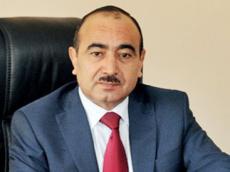|
|
TODAY.AZ / Politics
We condemn any support to aggressor regime of Armenia says Azerbaijani top official
23 February 2013 [10:35] - TODAY.AZ
 Head of Azerbaijani Presidential Administration's Social and Political Department Ali Hasanov has expressed his viewpoint over Turkish President Abdullah Gul's congratulating Serzh Sargsyan before the official announcement of the presidential election results in Armenia.
Head of Azerbaijani Presidential Administration's Social and Political Department Ali Hasanov has expressed his viewpoint over Turkish President Abdullah Gul's congratulating Serzh Sargsyan before the official announcement of the presidential election results in Armenia."We condemn any support to the aggressor regime until the Armenian-Azerbaijani Nagorno-Karabakh conflict is resolved, the army of the aggressor withdraws from the Azerbaijani lands and Azerbaijani territorial integrity is restored," Hasanov said, adding that Azerbaijani public is very sensitive towards any support to the aggressor.
"We express our protest against the contacts with Armenia and any support for Armenia's aggressor regime rendered at all levels - no matter whether it is the support at the level of parliament, public, media or NGO level," he said.
"This is not only Azerbaijan's position, but also the demand of Azerbaijani people, as well as the Turkish public."
Everyone knows that Turkish and Azerbaijani public exerted significant pressure on their governments for the borders with Armenia not to be opened until the occupation is ceased, Azerbaijani occupied territories are completely liberated and no support is provided to this regime. The public also stated that the regime must not be supported at the international arena."
"Of course, Azerbaijan is sensitive to any event, aimed at establishing the communication with Armenia," he said. "I believe we have a right for this."
The conflict between the two South Caucasus countries began in 1988 when Armenia made territorial claims against Azerbaijan.
Armenian armed forces have occupied 20 per cent of Azerbaijan since 1992, including the Nagorno-Karabakh region and seven surrounding districts.
Azerbaijan and Armenia signed a ceasefire agreement in 1994.The co-chairs of the OSCE Minsk Group - Russia, France and the U.S. - are currently holding peace negotiations.
Armenia has not yet implemented four U.N. Security Council resolutions on the liberation of the Nagorno-Karabakh and the surrounding regions.
/Trend/
URL: http://www.today.az/news/politics/119490.html
 Print version
Print version
Views: 1900
Connect with us. Get latest news and updates.
See Also
- 30 October 2025 [15:26]
Trial of Armenian citizens in Baku continues with new evidence review - 30 October 2025 [15:25]
President Ilham Aliyev dismisses head of Balakan District Executive Power - decree - 30 October 2025 [13:22]
France reaffirms support for Armenia-Azerbaijan normalization process - 30 October 2025 [13:13]
Underground-the Politburo. What about Ramiz Mehdiyev? - 30 October 2025 [12:23]
Pashinyan calls for public backing of peace with Azerbaijan, says ‘historic change’ achieved - 30 October 2025 [11:11]
Mountains, fears and roads: how to open the way between Azerbaijan and Armenia - 29 October 2025 [15:18]
Azerbaijan, Oman discuss deepening partnership during official talks - 29 October 2025 [11:57]
Azerbaijan–Belarus commission delegation visits Fuzuli and Agdam regions - 29 October 2025 [11:02]
Azerbaijani Foreign Minister meets Omani counterpart to boost bilateral cooperation - 28 October 2025 [16:16]
Crime without statute of limitations: five years since tragedy of Barda
Most Popular
 Road exchange and its subtleties for Baku and Yerevan
Road exchange and its subtleties for Baku and Yerevan
 Crime without statute of limitations: five years since tragedy of Barda
Crime without statute of limitations: five years since tragedy of Barda
 Pakistan closes airspace along border amid India’s large-scale military drills
Pakistan closes airspace along border amid India’s large-scale military drills
 President Ilham Aliyev visits cotton processing plant in Sabirabad Industrial Park
President Ilham Aliyev visits cotton processing plant in Sabirabad Industrial Park
 Azerbaijani Foreign Minister meets Omani counterpart to boost bilateral cooperation
Azerbaijani Foreign Minister meets Omani counterpart to boost bilateral cooperation
 World Bank urges Azerbaijan to accelerate reforms to attract private investment
World Bank urges Azerbaijan to accelerate reforms to attract private investment
 Zelensky: Work on plan for ceasefire in next ten days
Zelensky: Work on plan for ceasefire in next ten days
